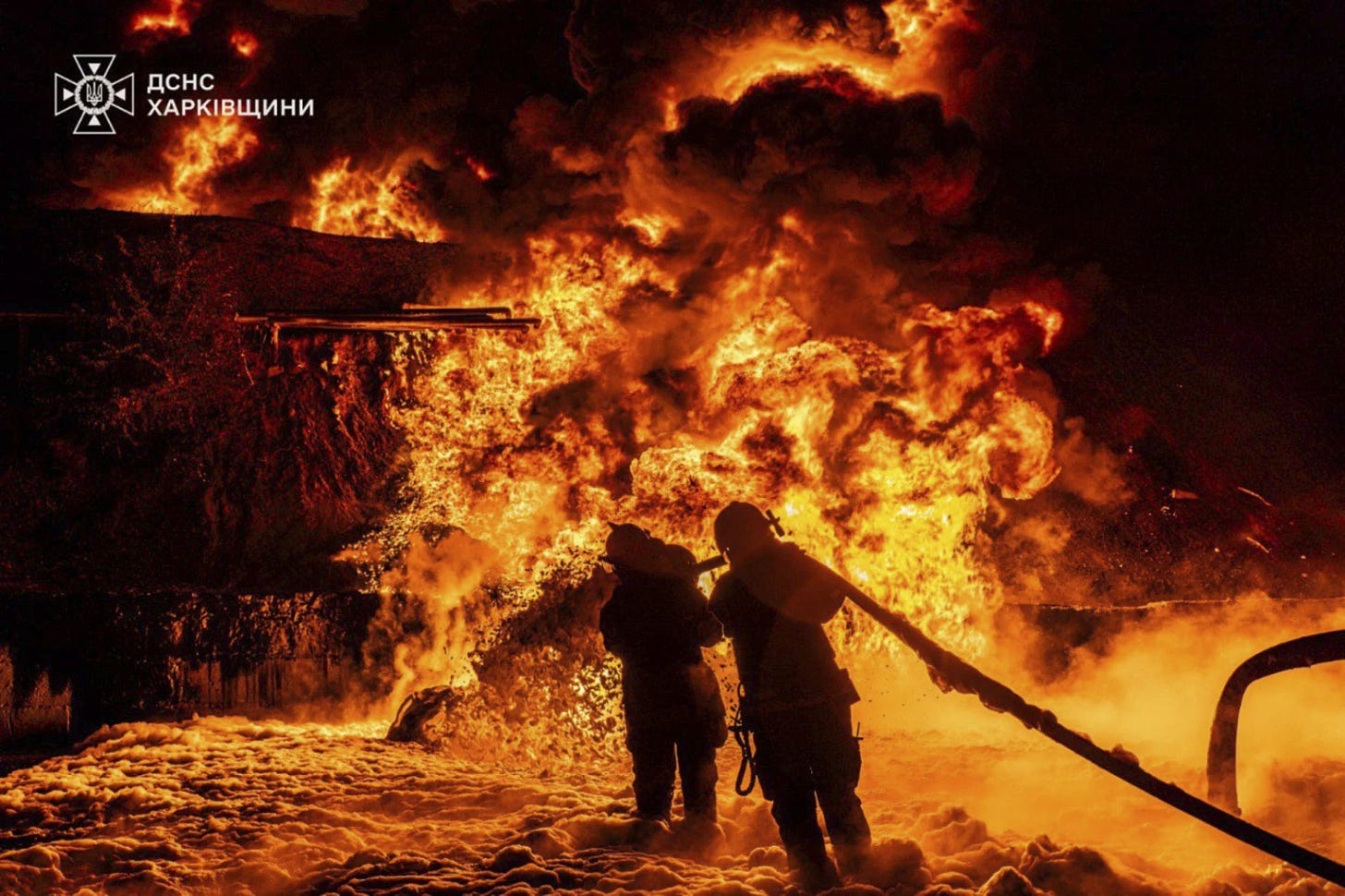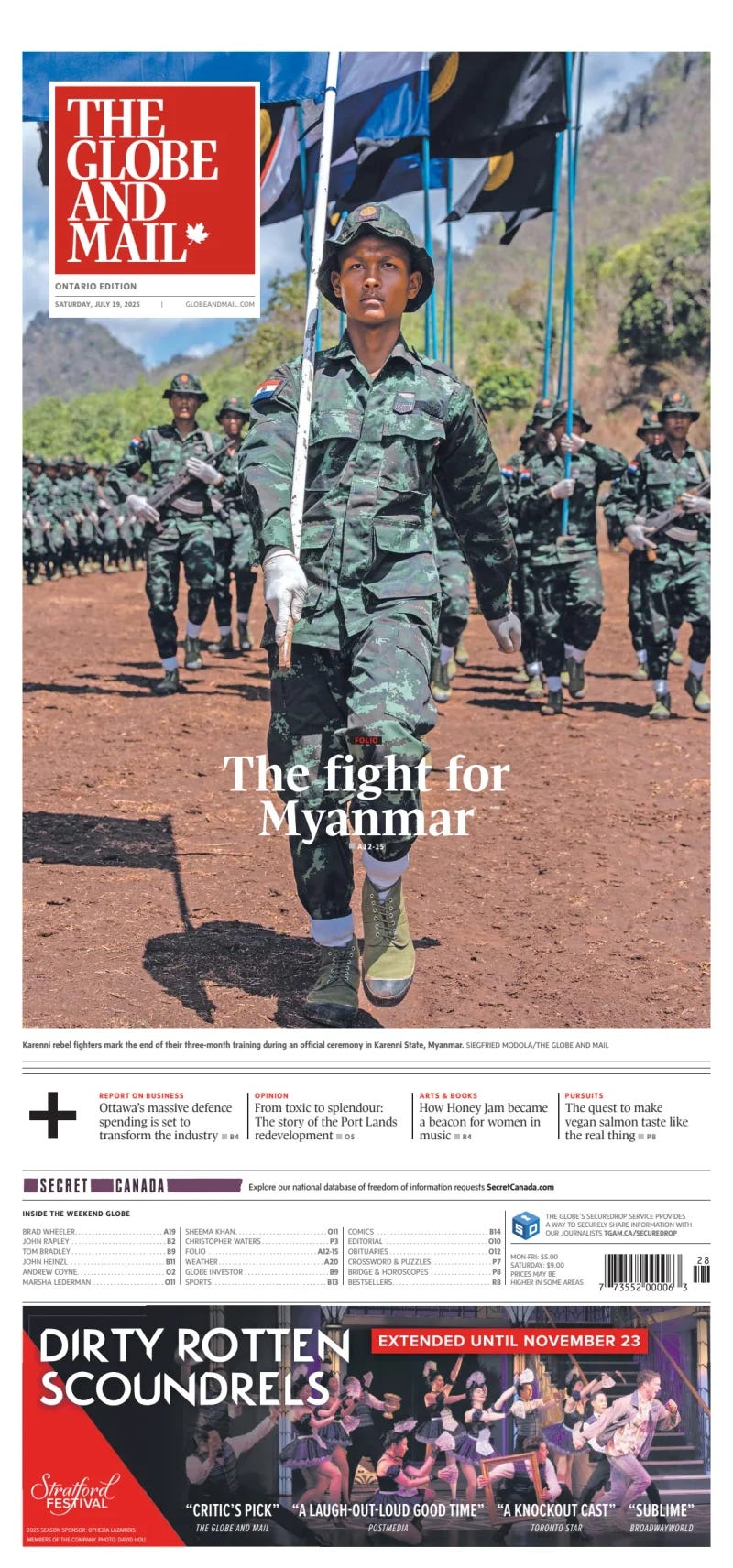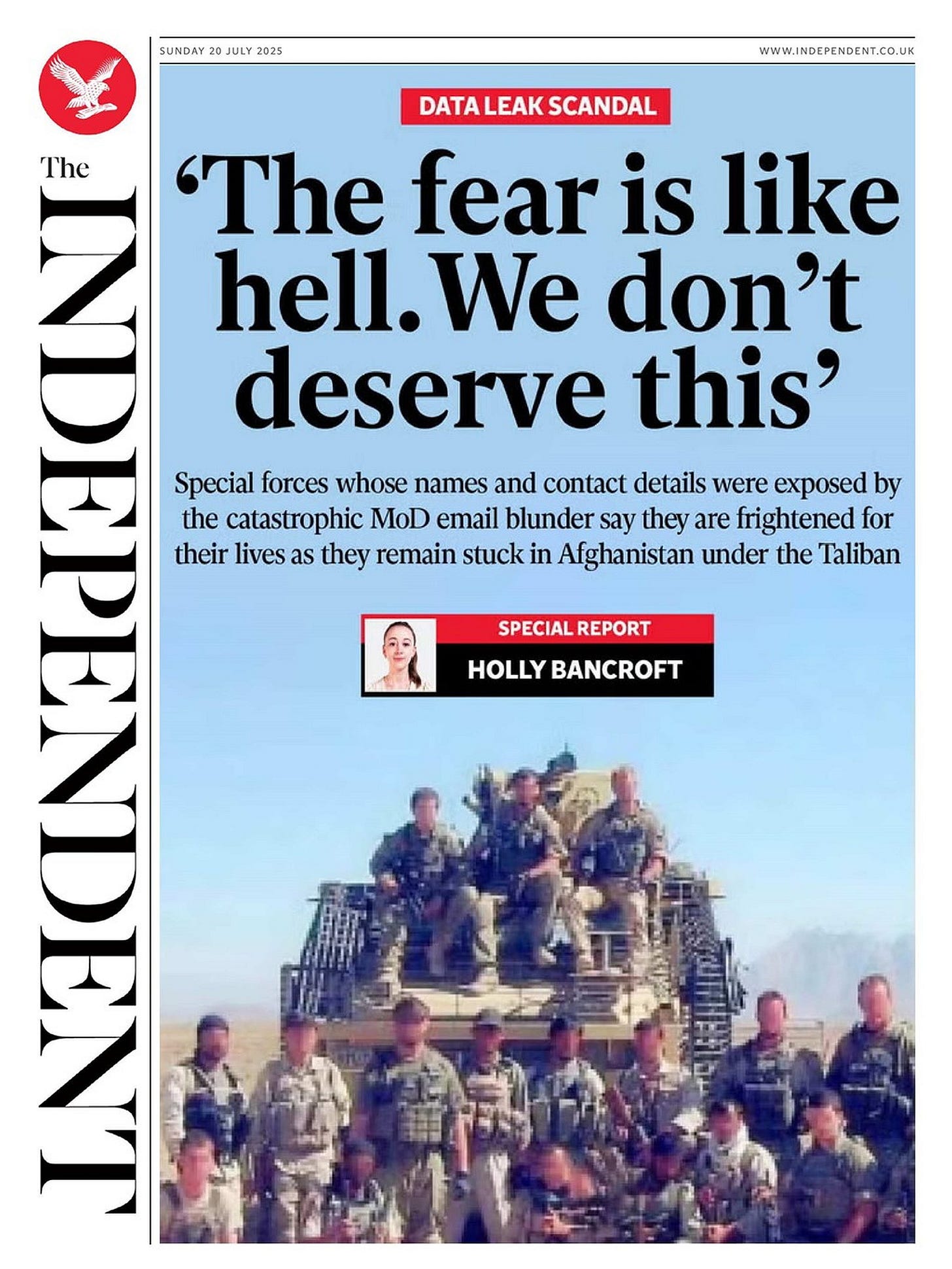Ukraine's Zelensky Extends Olive Branch — As Missiles Rain Down
Another round of “peace talks” offered to Putin. But is Ukraine walking into a trap while Russia keeps bombing and the West's support is long in coming?

Ukrainian president Volodymyr Zelensky has offered Vladimir Putin fresh peace talks after weeks of relentless Russian missile attacks. Mr Zelensky offered Moscow another round of ceasefire negotiations for next week, saying he wanted to speed up ending the conflict. It comes after weeks of relentless Russian strikes on Ukraine, including over 300 drones and 30 missiles launched on Friday night. “Everything should be done to achieve a ceasefire,” Mr Zelensky said in his evening address to the nation. “The Russian side should stop hiding from decisions.” Ukraine and Russia have held two rounds of talks in Istanbul over the past five months. They have agreed to swap prisoners but made no breakthroughs in ending almost three and a half years of conflict that started with Russia's 2022 invasion. Mr Zelensky said Rustem Umerov, who headed the Ukrainian delegation at both talks in Istanbul, had sent the Russian side the offer to hold the meeting next week, but gave no more details - Independent
Russian state media outlet TASS reported that a source close to Russia’s negotiating team confirmed that they had received Kyiv’s proposal for a meeting.
Kremlin spokesperson Dmitry Peskov told Russian media on Sunday that Russia is “ready to move quickly” on achieving a peace deal with Ukraine, but its “main goal” was to achieve its “objectives.” Russian President Vladimir Putin “has repeatedly expressed his desire to transition the Ukrainian settlement process into a peaceful track as soon as possible. It’s a lengthy process that requires effort, and it’s not simple. And most likely, this is increasingly being understood in Washington,” Peskov told Russian state media journalist Pavel Zarubin - CNN
Belarus has increased its spending on weaponry and military hardware sharply since 2022, budget numbers show. Government spending on military-related items -- including sophisticated Russian fighter jets and modern attack helicopters -- grew more than 2 1/2 times over the past three years, according to public budget and procurement documents reviewed by RFE/RL’s Belarus Service. The 2025 budget for all defense spending now totals around 4.7 billion Belarusian rubles ($1.6 billion) or around 2 percent of the country’s gross domestic product. That’s up from 1.8 billion rubles (US$694 million), around 0.95 percent of GDP, in 2022. Aleksandr Lukashenko, who has ruled Belarus since 1994, has embraced Russia as the country’s main protector. The two countries’ economies are tightly intertwined. Despite the close ties with Moscow, Lukashenko has tried to keep his distance from the Kremlin’s all-out invasion of neighboring Ukraine, steering clear of sending Belarusian soldiers to participate in the war. Russian forces launched part of their initial invasion in February 2022 from Belarusian territory. "Paradoxically, the level of Belarus's military spending suggests that despite flirting with Putin, Lukashenko does not particularly... expect that the Russian army will come and defend him, in case of a mythical NATO aggression,” said Ivan Kirichevskiy, a military analyst with the Ukraine-based online magazine Defense Express. “I would even say that the Belarusian army now has only one enemy: the Russian army.” - RFE/RL
My hot take: You don’t need to be a seasoned analyst to decode Kremlin spokesman Dmitry Peskov’s latest remarks in response to Kyiv’s offer of renewed peace talks. His comments are classic Kremlin doublespeak — a signal that Moscow intends to draw out negotiations for as long as possible while continuing its campaign of destruction across Ukraine and consolidating territorial gains. As I told BBC World Television earlier today, Russia seems to be exploiting the 50-day window effectively gifted by Donald Trump to accelerate its objectives in Ukraine — both militarily and diplomatically. It’s also worth noting that the offer of talks didn’t happen in isolation. In my BBC interview, I suggested that the recent visit to Kyiv by Trump’s envoy, General Keith Kellogg, may have given the Zelensky team a discreet nudge toward the negotiating table. That said, talks are still better than no talks at all. In OSCE circles, we used to call them confidence-building measures — small steps, even if symbolic, that could reduce tensions or open channels of communication. What remains to be seen is where these talks might take place: Turkey? Saudi Arabia? Or perhaps the Vatican, as recently proposed by the Holy Father.
Preliminary findings from a probe into World Economic Forum founder Klaus Schwab reveal that he allegedly manipulated the landmark Global Competitiveness Report to serve political interests and sent lewd emails to younger employees, Swiss newspaper SonntagsZeitung reported on Sunday. The probe also showed that his wife allegedly billed trips to the WEF despite holding no official position with the organization, according to the report. These findings appear to corroborate allegations contained in a whistleblower letter, which accused Schwab of financial misconduct — including misuse of WEF funds and inappropriate treatment of employees. The accusations reportedly prompted Schwab to step down from his role as chairman at the WEF — a non-profit best known for its annual gathering of global elites in Davos, Switzerland — after more than half a century at its helm. SonntagsZeitung reported that the probe's preliminary findings indicate that Schwab's alleged wrongdoing could include meddling with the Global Competitiveness Report — a now-defunct yearly publication that assessed and ranked countries based on their economic competitiveness. Official documents cited by SonntagsZeitung allege that Schwab intervened multiple times to alter or suppress unfavorable rankings for certain countries, particularly in the Middle East and North Africa and in India, allegedly to preserve diplomatic relations or avoid political fallout. In one instance, Schwab reportedly recommended shelving a negative report after discussing it with a government official, according to the newspaper - Politico
In the Gaza strip, at least 73 people were killed while attempting to access aid at several locations across on Sunday, the Hamas-run health ministry in the Palestinian territory said. The Israeli military said that soldiers had shot at a gathering of thousands of Palestinians in northern Gaza who posed a threat, and that it was aware of some casualties. But it said that the numbers being reported by teams in Gaza were far higher than the military’s initial investigation found. The military added that it is attempting to facilitate the entry of aid, and blamed Hamas militants for fomenting chaos and endangering civilians. The largest toll, according to the ministry and local hospitals, was in the northern part of the territory, where at least 67 Palestinians were killed while trying to reach aid entering northern Gaza through the Zikim crossing with Israel. It wasn't immediately clear whether they were killed by the Israeli army or armed gangs or both. But some witnesses said that the Israeli military shot at the crowd. Meanwhile, the Israeli military published new evacuation warnings for areas of central Gaza on Sunday, in one of the few areas where the military has rarely operated with ground troops. - Euronews
Fighting in Sudan’s Kordofan region that has killed hundreds and ongoing violence in Darfur — the epicenters of the country’s conflict — have worsened Sudan’s humanitarian crisis, with aid workers warning of limited access to assistance. The United Nations said more than 450 civilians, including at least 35 children, were killed during the weekend of July 12 in attacks in villages surrounding the town of Bara in North Kordofan province. “The suffering in Kordofan deepens with each passing day,” Mercy Corps Country Director for Sudan Kadry Furany said in a statement shared with The Associated Press. “Communities are trapped along active and fast changing front lines, unable to flee, unable to access basic needs or lifesaving assistance.” Sudan plunged into war after simmering tensions between the army and its rival, the paramilitary Rapid Support Forces, or RSF, escalated to fighting in April 2023. The violence has killed at least 40,000 people and created one of the world’s worst displacement and hunger crises, according to humanitarian organizations. In recent months, much of the fighting has been concentrated in the Darfur and Kordofan regions - AP
Americans largely oppose recent efforts by Donald Trump’s administration to scale up its deportation program, a new CNN poll conducted by SSRS finds, with a rising majority saying the president has gone too far in carrying out deportations. In the latest survey, 55% say the president has gone too far when it comes to deporting immigrants living in the US illegally, up 10 points since February. Opposition among Democrats and Democratic-leaning independents has risen in that time from widespread to nearly universal: Ninety percent of Democratic-aligned adults now say that Trump’s deportation policy has gone too far, while just 15% of Republican-aligned adults say the same. A 57% majority also say they oppose plans to build new detention facilities capable of holding up to 100,000 undocumented immigrants, while 53% oppose increasing the budget for Immigration and Customs Enforcement by billions of dollars — two White House priorities reflected in the sweeping policy bill that Trump recently signed into law. Overall, just shy of half, 46%, say Trump’s immigration policies have made the country safer, and 42% say the federal government has been careful about following the law in carrying out deportations. Both figures are largely unchanged since April. The president’s approval ratings are around 40% for his handling both of immigration in general and deportations specifically - CNN
The US has rejected the World Health Organization’s new efforts to combat international health emergencies, alleging the group threatens US sovereignty and “lays the groundwork for global surveillance of every human being”. In a statement on Friday, US health secretary Robert Kennedy Jr said the US had opted out of changes that the WHO approved last year to better respond to severe disease outbreaks. Kennedy’s decision comes one day before the deadline to decline the amendments. “The new regulations employ extremely broad language that gives the WHO unprecedented power,” Kennedy said. “That opens the door to the kind of narrative management and propaganda and censorship that we saw during the Covid pandemic.” The US rejection of the WHO amendments could hamper global co-operation for future health crises. WHO director-general Tedros Adhanom Ghebreyesus had hailed the changes last year for bolstering countries’ ability to share information and respond to potential pandemics. The amendments also call for members to commit additional financing and medical products for developing countries. The WHO changes came under fire from US conservatives last year, leading House Republicans to pass legislation rejecting the measures. The global health body’s first ever pandemic agreement agreed this year, however, explicitly reaffirms country sovereignty and gives the WHO no powers to restrict travel, mandate vaccines or impose lockdowns. Kennedy, a long-standing vaccine sceptic, has previously made statements, without evidence, alleging serious wrongdoing in relation to the pandemic. He has described some Covid-19 jabs as “the deadliest vaccine[s] ever made” and said the virus was “ethnically targeted” to spare Ashkenazi Jews and Chinese people - FT
Typhoon Wipha toppled trees and caused major flight disruptions Sunday in Hong Kong and at some nearby airports in China as it moved west off the southern coast of the country. Airports in Hong Kong, Shenzhen, Zhuhai and the casino hub of Macao canceled or postponed flights for most of the day, according to their websites. Hong Kong grounded at least 400 flights, affecting around 80,000 passengers, broadcaster RTHK said. Some high-speed train services were also suspended. The typhoon stayed just offshore until about 6 p.m., when it made landfall in a coastal area of Taishan city in Guangdong province, China’s National Meteorological Center said. It then weakened to a severe tropical storm with maximum sustained winds of 108 kph (67 mph). Earlier Sunday, the Hong Kong Observatory issued a hurricane signal No. 10, its highest warning. The eye of the storm passed just south of the city around midday with maximum sustained winds of 140 kph (87 mph), the observatory said - AP
Cathay Pacific, Hong Kong’s embattled flag carrier, is facing criticism after failing to adequately notify travelers about mass flight cancellations caused by Tropical Cyclone Wipha. Although the airline grounded all flights at Hong Kong International Airport between 5 a.m. and 6 p.m. on Sunday, it failed to issue a single tweet or timely public alert to warn customers. Once considered a benchmark for customer service in the Asia-Pacific region — alongside Singapore Airlines — Cathay’s communications meltdown has left some questioning whether the carrier is still fit to lead. In an email shared with World Briefing, one long-time Hong Kong resident and Cathay frequent flier described an “almost total collapse” of Cathay’s customer service systems. “The airline sent a cancellation email roughly three hours before departure. The typhoon must have come as a shock to them then?” He added: “Calls were ignored for hours. The website and booking systems were overwhelmed and under-gunned. It’s very sad — and unnecessary. As frequent flyers, we understand that typhoons happen. What distinguishes a good airline from a relic is how it treats its customers. On this occasion, Cathay was weighed in the balance and found wanting.” A formal apology from the airline came only late Sunday via its website, where Cathay acknowledged long wait times and announced it would waive ticket change fees — a gesture many passengers said came far too late.







Zelensky is not "extend[ing] an olive branch." He knows there is no possibility of making "peace" with Russia, and that Russia wants lots and lots more war. What he's doing is building a solid imagine of Ukraine as reasonable, cooperative, and peace-oriented. All to contrast with Russians as duplicitous violent marauders. He's not "begging for a ceasefire" because he knows it can't happen, he doesn't need it, and a ceasefire would actually harm Ukraine.
Who is "winning" right now isn't only a matter of square kilometers and lives lost. Germany invaded in June of 1941. By the end of that year they had killed 4.5 million soldiers, taken territory right to the outskirts of Moscow, and destroyed mind-boggling numbers of Soviet tanks and planes. "Clearly winning," they were...
Im sorry. Why should Russia, a country, who is clearly winning a war, stop because a bunch of losers 'the Ukrainians' who are losing said war, are begging for a cease fire?
I get it Im talking to the French who are the biggest losers of the 20th Century, but seriously I dont understand how is this so hard?